|
|
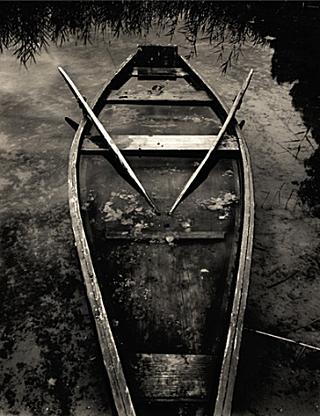
Roman Loranc
_______________________
Interview with the Boatman
Laurie Kutchins
The boatman’s boat bumps up against the dock—
he waits for his passengers to step in—
coins in hand, they look up, find the circling hawk.
But a job he winks, set to punch the clock.
All paths lead to the river’s mud and din.
The boatman’s boat bumps up against the dock.
How do you get this job, checking the rock
Shore of the living, recognizing kin—
Coins in hand, they look up, watch the circling hawk.
Dunno, his shoulders ripple, his keys knock.
He padlocks his barrels of rum and gin.
The boatman’s boat bumps up against the dock.
...(more)
Three poems
Laurie Kutchins
drunken boat
_______________________

Gust of Wind
Lucien Lévy-Dhurmer
b. September 30, 1865
_______________________
Five Poems
Carlos Pardo
translated by Elizabeth Zuba
conjunctions
Ode to Messianism
Carlos Pardo
Even if we fell into a mirror
the compass would still look
for a hole in our ribs
to trace the world: keep low
your heart flush at ground level,
extremities anchored
and eyes still dreamy in the clouds
from a century of characterless theater,
in gold,
already more dream than life.
I don’t say this for my own sake
although I’ve noticed
the same dilation to the end
of each pore. The oracles gather.
The relentless shadow is not my father.
Messianism,
megaphone of tradition:
nose tipped back in the air
warm nape of Spring,
a dusty republic,
its terrestrial branches
waiting below a winter
of constellations.
...(more)
_______________________

Ready for the Rise
Roman Loranc
1 2 3 4 5
_______________________
In The Afternoon Babylon
Grzegorz Wróblewski
translated by Adam Zdrodowski
exquisite corpse
A leaf functions until the last moment. Even when it falls from the tree,
it still breathes. In 1546 an unknown fish was caught off the shore of Denmark.
The fish had long fins and a tail, and its scales were covered by a brown habit.
They called it a sea monk. Did you know that Richard Kuklinski
from the Bronx murdered 100 people? He kept the quartered bodies
in the fridge. He went down in history as the mad “Iceman”! A seal trainer:
My alumni can play water polo and are the idols of handicapped
youth. (The Copenhagen zoo greets people and pensioners – animals:
no admittance!) An invasion follows… A mushroom, clasterosporium carpophilum,
is approaching us… Lazy pugs – multum in parvo!
In 1733 Karl Alexander, The Duke of Württemberg, had a pug monument
erected in Winnenthal castle. (Pugs need a 20-minute walk every day.)
Remember before you fall asleep: Only broccoli will cure your paranoia
once and for all. 3 inconvenient questions: What was the fate of the sea monk?
Did they let him speak to the smoked flounder mongers?
Or maybe they had a festive post-mortem? The chronicles are silent on this point…
Peroxide Joanna speaks: My relatives used to like plums and in December they fed on
meatless sauerkraut stew. It must blend well…– they would whisper mysteriously
beneath their quilts. (The Clasterosporium mushroom…) This time it was my
last visit – I promise to myself and I shut my eyelids tight.
On the other side the winged “Iceman” awaits me.
A Marzipan FactoryGrzegorz Wróblewski
translated by Adam Zdrodowski otoliths
Five Poems
Grzegorz Wróblewski counterpunch
Wróblewski at Writing the Polish Diaspora
Wróblewski at The PIP (Project for Innovative Poetry)
Ten Poems
Grzegorz Wróblewski
translated from the Polish by Adam Zdrodowski
exquisite corpse
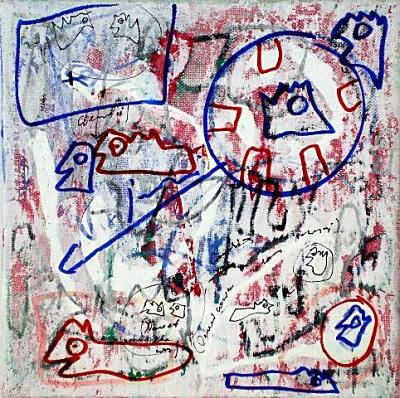
Creative Disorder
Grzegorz Wróblewski
The New Post-literate: A Gallery Of Asemic Writing
_______________________
On “Miscellany”
Akeel Bilgrami
3quarksdaily
To the extent that one values truth in the cognitive sense (that science and philosophy pursue), then to that extent, one cannot regret the shedding of a false belief. To regret the loss of a false belief would be to fail to understand the nature and point of inquiry into truth, as cognitively conceived. Literature, typically, has no particular mind for truths, conceived in these cognitive terms, truths suited to presentation and representation rather than expression. That is why literature so often contains expression of regret for loss. One would have to search hard in philosophy for such a thing and would find it only where it is most self-consciously styled on literary forms –perhaps on confessional sites, as in Augustine or Kierkegaard.
It is a fond thought that literature, in giving us pleasures that are miscellaneous --rather than the satisfaction of the deep integrities of scientific and philosophical thought-- is like life itself. It is natural to think that the pleasures of life are indeed miscellaneous, more like those of literature than of philosophy because literature is an outgrowth of life while philosophy is an abstraction from it. But if literature is inherently miscellaneous, and if miscellany depends on singular objects tied to qualities that preempt obsolescence, then life all around us seems to resist any resemblance to literature. Take a look at Shanghai or Mumbai. Whatever euphoria those places generate, it is unlikely that they will retain much of their miscellany. And, we are told, that it is Shanghai and Mumbai that reflect the lives in our ‘global’ future, not Varanasi, not Rome.
That puts a great burden on literature. It is an increasingly rare conserving site. ...(more)
_______________________
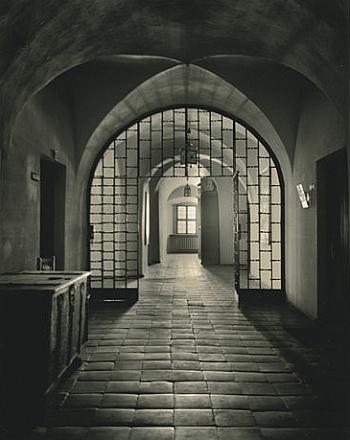
Roman Loranc
_______________________
The Poet's Corner
Laura (Riding) Jackson
Here where the end of bone is no end of song
And the earth is bedecked with immortality
In what was poetry
And now is pride beside
And nationality,
Here is a battle with no bravery
But if the coward's tongue has gone
Swording his own lusty lung.
Listen if there is victory
Written into a library
Waving the books in banners
Soldierly at last, for the lines
Go marching on, delivered of the soul.
And happily may they rest beyond
Suspicion now, the incomprehensibles
Traitorous in such talking
As chattered over their countries' boundaries.
The graves are gardened and the whispering
Stops at the hedges, there is singing
Of it in the ranks, there is a hush
Where the ground has limits
And the rest is loveliness.
And loveliness?
Death has an understanding of it
Loyal to many flags
And is a silent ally of any country
Beset in its mortal heart
With immortal poetry.
_______________________

photo - mw
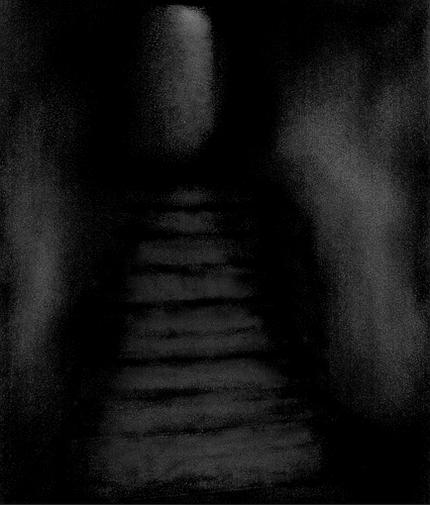
Into the Darkness
Robb Johnson
1 2
via riley dog
_______________________
Be still. The Hanging Gardens were a dream
That over Persian roses flew to kiss
The curlčd lashes of Semiramis.
Troy never was, nor green Skamander stream.
Provence and Troubadour are merest lies
The glorious hair of Venice was a beam
Made within Titian's eye. The sunsets seem,
The world is very old and nothing is.
Be still. Thou foolish thing, thou canst not wake,
Nor thy tears wedge thy soldered lids apart,
But patter in the darkness of thy heart.
Thy brain is plagued. Thou art a frighted owl
Blind with the light of life thou 'ldst not forsake,
And Error loves and nourishes thy soul.
-
Trumbull Stickney
Trumbull Stickney at The Poetry Foundation
The Poems of Trumbull Stickneyin many downloadable formats archive.org_______________________
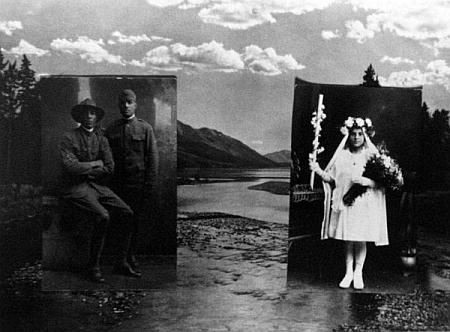
Confirmation, Chicago
Linda Connor
1968
Students from the Institute of Design:
The Harry Callahan and Aaron Siskind Years, 1946 to 1971
_______________________
the limits of photographic character: images you thought never existed
stacy oborn
Posted on Wednesday, September 27, 2006
i would imagine that the images which fill my private gallery space contain a single continuous thread: those images which i’d like to imagine some other version of myself might have taken. which is not to say: images i wish i had taken or images that i wish i had the capacity to take. no, i mean the images which, given a different set of priorities or choices made, are those that i (perhaps delusionally) know are things i could have seen myself seeing. as if these images, when i encounter them, are an aha! moment of negated destiny.
alack and alas, we all choose (and keep choosing) who it is to be and who it is we want to become. and in the choosing, so many paths-not-taken fall to the side. this notion of self-identity and awareness of that self has got me thinking about a schematic construct i once encountered, thought was incredibly important, and over the succeeding years had nearly forgotten all about. considering my abiding interest in art, art-making and art-makers, it was alarming to me that it had nearly slipped through the cracks. i’ll get on more about it later, but as an initial tease-of-thought the idea i’m speaking about is that of photographic character.
it goes something like this:
Projects + Ideology + Temperament + Social Group + Psycho-biography
=
photographic character
...(more)
_______________________

Mitsuru Fujita
japan exposures
via gmtPlus9 (-15)
_______________________
Life, A Work of Art Without an Author: The State of Exception, the Administration of Disorder and Private Life
Interview with Giorgio Agamben
conducted by Ulrich Raulff in Rome on 4March 2004
translation by Morag Goodwin,
I am not an historian. I work with paradigms. A paradigm is something like an example, an exemplar, a historically singular phenomenon. As it was with the panopticon for Foucault, so is the Homo Sacer or the Muselmann or the state of exception for me. And then I use this paradigm to construct a large group of phenomena and in order to understand an historical structure, again analogous with Foucault, who developed his “panopticism” from the panopticon. But this kind of analysis should not be confused with a sociological investigation.you say that the classical realm of the
political will become ever narrower – and that sounds somewhat critical and
decadently theoretical.
Allow me to reply with Benjamin: there is no such thing as decline. Perhaps this is because the age is always already understood as being in decline. When you take a classical distinction of the political-philosophical tradition such as public/private, then I find it much less interesting to insist on the distinction and to bemoan the diminution of one of the terms, than to question the interweaving. I want to understand how the system operates. And the system is always double; it works always by means of opposition. Not only as private/public, but also the house and the city, the exception and the rule, to reign and to govern, etc. But in order to understand what is really at stake here, we must learn to see these oppositions not as “di-chotomies” but as “di-polarities,” not substantial, but tensional. I mean that we need a logic of the field, as in physics, where it is impossible to draw a line clearly and separate two different substances. The polarity is present and acts at each point of the field. Then you may suddenly have zones of indecidability or indifference. The state of exception is one of those zones.(....)
The idea that one should make his life a work of art is attributed mostly today to Foucault and to his idea of the care of the self. Pierre Hadot, the great historian of ancient philosophy, reproached Foucault that the care of the self of the ancient philosophers did not mean the construction of life as a work of art, but on the contrary a sort of dispossession of the self. What Hadot could not understand is that for Foucault, the two things coincide. You must remember Foucault’s criticism of the notion of author, his radical dismissal of authorship. In this sense, a philosophical life, a good and beautiful life, is something else: when your life becomes a work of art, you are not the cause of it. I mean that at this point you feel your own life and yourself as something “thought,” but the subject, the author, is no longer there. The construction of life coincides with what Foucault referred to as“se deprendre de soi.” And this is also Nietzsche’s idea of a work of art without the artist....(more)
_______________________

Mystical Landscape with Snake Mask
Alan Davie
b. Sept. 28, 1920
Painter, poet, jazz musician and jeweller
_______________________
The Sweet Community
Ann E. Michael
Qarrtsiluni
You show me the teeming hive
smoke-dulled into sluggishness,
magnetized—the framed comb
attracting the rapt attention
of all those hovering bodies.
This sweet community, you say,
absorbed in its constant task,
procreation, delivering and seeking,
sipping and sucking, hard at the work
of construction, regurgitating
what they know to raise
the next generation.
You say there is a dance that means food,
a dance for sex, a dance for “follow me.”
And when a virus enters the square,
stacked cities, all humming ceases,
empty shells litter the floor boards,
a spectacle of curled black legs—
they live and die together, collective
wisdom, you tell me: You,
their outsider in a wreath of smoke,
their mesh-masked god of plunder.
more poems by Ann E. Michael at Quarrtsiluni
_______________________
We Refugees
Giorgio Agamben
Translation by Michael Rocke
If in the system of the nation-state the refugee represents such a disquieting element, it is above all because by breaking up the identity between man and citizen, between nativity and nationality, the refugee throws into crisis the original fiction of sovereignty. Single exceptions to this principle have always existed, of course; the novelty of our era, which threatens the very foundations of the nation-state, is that growing portions of humanity can no longer be represented within it. For this reason - that is, inasmuch as the refugee unhinges the old trinity of state/nation/territory - this apparently marginal figure deserves rather to be considered the central figure of our political history. It would be well not to forget that the first camps in Europe were built as places to control refugees, and that the progression - internment camps, concentration camps, extermination camps - represents a perfectly real filiation. One of the few rules the Nazis faithfully observed in the course of the "final solution" was that only after the Jews and gypsies were completely denationalized (even of that second-class citizenship that belonged to them after the Nuremberg laws) could they be sent to the extermination camps. When the rights of man are no longer the rights of the citizen, then he is truly sacred, in the sense that this term had in archaic Roman law: destined to die.
It is necessary resolutely to separate the concept of the refugee from that of the "Rights of man," and to cease considering the right of asylum (which in any case is being drastically restricted in the legislation of the European states) as the conceptual category in which the phenomenon should be impressed (a glance at the recent Test sul diritto d'asilo by A. Heller shows that today this can lead only to nauseating confusion). The refugee should be considered for what he is, that is, nothing less than a border concept that radically calls into question the principles of the nation-state and, at the same time, helps clear the field for a no-longer-delayable renewal of categories. In the meantime, the phenomenon of so-called illegal immigration into the countries of the European Community has assumed (and will increasingly assume in coming years, with a foreseen 20 million immigrants from the countries of central Europe) features and proportions such as to fully justify this revolution in perspective. What the industrialized states are faced with today is a permanently resident mass of noncitizens, who neither can be nor want to be naturalized or repatriated. Often these noncitizens have a nationality of origin, but inasmuch as they prefer not to make use of their state's protection they are, like refugees, "stateless de facto" For these noncitizen residents, T. Hammar created the neologism denizens, which has the merit of showing that the concept citizen is no longer adequate to describe the sociopolitical reality of modern states. On the other hand, citizens of the advanced industrialized states (both in the United States and in Europe) manifest, by their growing desertion of the codified instances of political participation, an evident tendency to transform themselves into denizens, into conformity with the well-known principle that substantial assimilation in the presence of formal differences exasperates hatred and intolerance, xenophobic reactions and defensive mobilizations will increase.
Before the extermination camps are reopened in Europe (which is already starting to happen), nation-states must find the courage to call into question the very principle of the inscription of nativity and the trinity of state/nation/territory which is based on it....(more)
_______________________
Quiet After the Rain of Morning
Trumbull Stickney
Quiet after the rain of morning
Midday covers the dampened trees;
Sweet and fresh in the languid breeze
Still returning
Birds are twittering at ease.
And to me in the far and foreign
Land as further I go and come,
Sweetly over the wearisome
Endless barren
Flutter whisperings of home.
There between the two hillocks lightens
Straight and little a bluish bar:
I feel the strain of the mariner
Grows and tightens
After home and after her.
_______________________
The Eye and the Page
visual cues: typography's potential in the prose poem
Ann E Michael
In a musical phrase as written in a score, there are bars that tell us where the measure ends; but the phrase may overrun the measure. If we are singers or wind-instrument players, it is not the bar that tells us where to breathe: it is the phrase. Certain phrases offer natural caesuras. With long, syncopated or complex phrases, the breathing places may not be as obvious. Figuring out where to breathe may be part of the challenge of the score. It is also crucial to an excellent performance. A dull performance can result from beautiful notes that are performed without invention, that lack a vivifying sense of breath. The same is true for the verse poem and for the prose poem. But the cues are different. When a poet decides that a poem is operating most effectively in prose form, the writer still has options about its presentation on the page—options that affect how the reader interacts with the piece.
Consciously or not, most writers of good prose poetry are influenced by the long history of the well-considered line break. Decisions about margins, line lengths and line breaks subtly alter the pacing of a piece and thus its inflections and, ultimately, its meaning....(more)
_______________________
Mnemosyne
Trumbull Stickney
1874-1904
(....)
It 's empty down the country I remember.
I had a sister lovely in my sight:
Her hair was dark, her eyes were very sombre;
We sang together in the woods at night.
It 's lonely in the country I remember.
The babble of our children fills my ears,
And on our hearth I stare the perished ember
To flames that show all starry thro' my tears.
It 's dark about the country I remember.
There are the mountains where I lived. The path
Is slushed with cattle-tracks and fallen timber,
The stumps are twisted by the tempests' wrath.
But that I knew these places are my own,
I 'd ask how came such wretchedness to cumber
The earth, and I to people it alone.
It rains across the country I remember.
_______________________
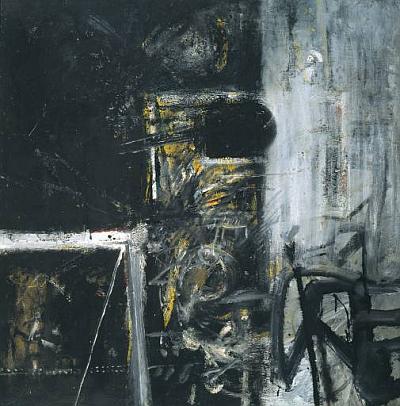
Black Mirror
Alan Davie
1952
_______________________
The melancholy year is dead with rain.
Drop after drop on every branch pursues.
From far away beyond the drizzled flues
A twilight saddens to the window pane.
And dimly thro' the chambers of the brain,
From place to place and gently touching, moves
My one and irrecoverable love's
Dear and lost shape one other time again.
So in the last of autumn for a day
Summer or summer's memory returns.
So in a mountain desolation burns
Some rich belated flower, and with the gray
Sick weather, in the world of rotting ferns
From out the dreadful stones it dies away.
-
Trumbull Stickney

Suginami
James Luckett
consumptive
Suginami reviewed
Stacy Oborn
_______________________
Thomas Bernhard for life
an interview from 1986
Werner Wögerbauer
Translation: Nicholas Grindell
signandsight
Your characters and you yourself often say they don't care about anything, which sounds like total entropy, universal indifference of everyone towards everything.
Not at all, you want to do something good, you take pleasure in what you do, like a pianist, he has to start somewhere too, he tries three notes, then he masters twenty, and eventually he knows them all, and then he spends the rest of his life perfecting them. And that's his great pleasure, that's what he lives for. And what some do with notes, I do with words. Simple as that. I'm not really interested in anything else. Because getting to know the world happens anyway, by living in it, as soon as you walk out the door you're confronted with the world directly. With the whole world. With up and down, back and front, ugliness and beauty, perfectly normal. There's no need to want this. It happens of its own accord. And if you never leave the house, the process is the same.
(....)
What kind of intellectual aims do you...
These are all questions that can't be answered because no one asks themselves that sort of thing. People don't have aims. Young people, up to 23, they still fall for that. A person who has lived five decades has no aims, because there's no goal.
(....) Everyone lives until they die. And a great deal happens in between. But for most people it's of no interest. Mostly only for the person living it. The truth is that each person, even if he is interested in others, is interested only in himself. It's all about indirect benefits. It's the same everywhere, whatever it is, children's villages, the Sahel, hunger in Nicaragua. Mister Ortega puts on just as much of a self-serving theatre act as Mister Reagan, whichever way you look at it. People only do things they think will help them get ahead and keep going. Even if you become a nun or a monk, that's all you have in mind, you have no choice. In fact, if you want to be a monk and serve, that will make you especially ghastly and misanthropic. That's the way it is, I believe. With faith. As it were....(more)
via Matthew Flanagan
Landscape Suicide
Descriptive Zoopraxography _______________________

Wylfa, Wales
2005
Fluffy Clouds
Jürgen Nefzger
Review: Fluffy Clouds by Jürgen Nefzger
Joerg Colberg
I suppose we could take Fluffy Clouds as an example of what contemporary landscape photography might look like. Or maybe we should just get rid off the “contemporary” altogether. After all, had there been nuclear reactors around at the time of the Dutch Golden Age (a ludicrous thought, I know, but let’s entertain it), they would surely have ended up in the paintings along with the windmills. ...(more)

East Harbour District
Dunkirk
Jürgen Nefzger
_______________________
Banned Books Week Sept 25 - Oct 2The 10 most challenged titles for 2009
 Opernplatz
10 May 1933
The volumes consigned to the flames in Berlin, and more than 30 other university towns around the country on that and following nights, included works by more than 75 German and foreign authors, among them (to cite but a few) Walter Benjamin, Bertolt Brecht, Albert Einstein, Friedrich Engels, Sigmund Freud, André Gide, Ernest Hemingway, Franz Kafka, Lenin, Jack London, Heinrich, Klaus and Thomas Mann, Ludwig Marcuse, Karl Marx, John Dos Passos, Arthur Schnitzler, Leon Trotsky, HG Wells, Émile Zola and Stefan Zweig. Also among the authors whose books were burned that night was the great 19th-century German poet Heinrich Heine, who barely a century earlier, in 1821, had written in his play Almansor the words: "Dort, wo man Bücher verbrennt, verbrennt man am Ende auch Menschen" – "Where they burn books, they will, in the end, also burn people."
- Jon Henley
_______________________
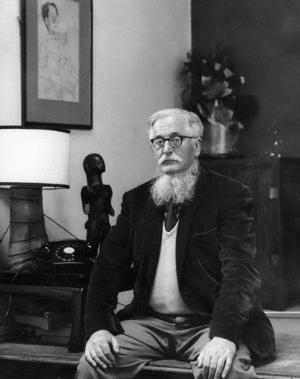
William Empson
b. 27 September 27, 1906
photo - Mark Gerson, 1965
It is this deep blankness is the real thing strange.
The more things happen to you the more you can't
Tell or remember even what they were.
The contradictions cover such a range.
The talk would talk and go so far aslant.
You don't want madhouse and the whole thing there.
-
William Empson, Let It Go
Seven Types Of Ambiguity
William Empson (1949) Open Archive
_______________________

Walter Benjamin
d. September 27, 1940
Fragments of the Passagenwerk
A meander through the Arcades project of Walter Benjamin
Printing, having found in the book a refuge in which to lead an autonomous existence, is pitilessly dragged out onto the street by advertisements and subjected to the brutal heteronomies of economic chaos. This is the hard schooling of its new form. If centuries ago it began gradually to lie down, passing from the upright inscription to the manuscript resting on sloping desks before finally taking to bed in the printed book, it now begins just as slowly to rise again from the ground. The newspaper is read more in the vertical than in the horizontal plane, while film and advertisement force the printed word entirely into the dictatorial perpendicular. And before a child of our time finds his way clear to opening a book, his eyes have been exposed to such a blizzard of changing, colourful, conflicting letters that the chances of his penetrating the archaic stillness of the book are slight.
-
Walter Benjamin, One-Way Street

Across the Harbor
1908
Arthur Bowen Davies
b. September 26, 1863
_______________________
The Jetty
Vona Groarke
Summer-bleached and swaddling the paddle-boat
and tin canoe, the jetty shoulders, for a moment,
clean right angles, lichen seams heavy as voices
tacking now across water, calling ‘don’t’ or ‘boat’,
it hardly matters to me. The way I scribble
is like the way a squirrel or a cardinal
is fumbling in the thicket to my left:
at least he knows what he’s looking for.
I think I’ve found it when the opposite hill
throws down another version of itself
on the lake’s gloss. Soon the evening
will soak boat and jetty, this very page.
By then, I’ll have slipped inside a fuchsia bud
of wine and spindle tips of light from a porch
over the lake that answers, very nicely, to our own.
_______________________
Vona Groarke - Poetry International Web
more poems 1 2 3 4
_______________________
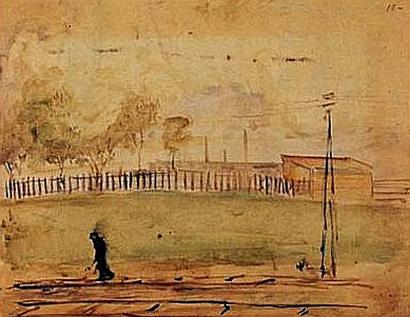
August Macke
_______________________
And the trees about me,
Let them be dry and leafless; let the rocks
Groan with continual surges; and behind me,
Make all a desolation. Look, look, wenches!
Paint me a cavernous waste shore
Cast in the unstilled Cyclades,
Paint me the bold anfractuous rocks
Faced by the snarled and yelping seas.
Display me Aeolus above
Reviewing the insurgent gales
Which tangle Ariadne's hair
And swell with haste the perjured sails.
....
- T. S. Eliot (September 26, 1888 - January 4, 1965), Sweeney Erect
_______________________
Mock Duck Mandarin
– the sound and the fury
Talk given at the Sound Poetry Seminar in Kuopio, Finland, 4 September 2010.
Eirķkur Örn Noršdahl
I tend to write three general kinds of poetry which I keep more or less separated in the writing practice, although the borders tend to blur before publication. First there’s the poetry meant for the page. As a rule, I approach this type of poetry as a solitary action – it is written in private and it is to be read in private and it functions more on an intellectual, lyrical or humanist level; there’s generally speaking less humour and less entertainment, or at least a different form of humour and entertainment, although this isn’t consciously made to be so.
Second, there’s the poetry meant for the internet – often my approach to this is a relaxed one; this is where I’ll put most of my found poetry, poetry that I find immediately relevant, but perhaps not meant for the long-run, and poetry that has either a social (interactive) function or a visual aspect I feel is better presented online than on a page. I also put all my video poetry online, but I feel it belongs to it’s own separate gesamtkunstwerks-category and should perhaps be published on DVD or some similar format. For technical reasons, this has not happened though.
Finally there’s performance poetry – the poetry I’ll try to present here. Most of this poetry employs some sort of conceptual gimmick: I wrote a series of short poems based on the names of dictators; a long collage from the poetic works of a 17th century Icelandic lunatic; a google-sculpture based on Icelandic nationalist rhetoric in English; I’ve written a sonnet based only on abbreviations; and I’ve written (or self-plagiarized) poetry to be performed in various Scandinavian accents (as they sound in the ears of the performer).
As I said, this is how it’s compartmentalized in my head – when I sit down to write – but that doesn’t necessarily mean that’s how it ends up. Sound poetry might end up written in a book or as accompaniment to a visual poem online; page poetry might end up online or get read at a festival; and a provisional found poem might get published in a book and thus get granted some sort of extended life.
A worthy note: I usually perform my poetry for people who don’t understand Icelandic. Not only do I live in Finland, where only a handful of the inhabitants speak Icelandic, but I mostly perform at festivals in various countries outside Iceland – with a few local readings. My circumstances thus push the poetry performances further into the domain of sound poetry than they perhaps belong....(more)
_______________________
Fate
Vona Groarke
irish times
I do not know what it is in me that would want to bunker down
in a fairy story that could nutshell
nine hundred years to my two
and would have me speak
with the throat of a bird
or the throat of a reed by the side of a lake
with nowhere to go.
...(more)
via The Page
_______________________
State of the Union
Timothy Burke
Easily Distracted
One of the commitments I carried into blogging from the outset was to try and build bridges to conservatives. ...
(....)
The horror of many of these ‘conservatives’ at the mutable and vague object they scorned as intellectual “postmodernism” or “relativism” is as much confession as critique. I can think of nothing more relativist and will-to-power than mainstream public-sphere conservative writing and punditry in the US over the past decade.
The folks with whom I still wanted to have continuing conversations with generally didn’t identify as conservatives even if they also were wary of other labels or affiliations. So while I still see one of the basic goals of online conversation as building in strange attractors, I’ve learned that one large segment of the discursive galaxy is full of nothing but emptiness, populated by swirling rhetorical singularities that swallow up any who approach them. (....)
The third concern I had when I started blogging is as alive and complex and worrisome as it ever was. Mapping the current political situation onto the social landscape of America is a confusing, difficult and yet urgently necessary exercise. I’m still very worried that a lot of people I know are inclined to dangerous forms of shorthand in thinking about the social architecture of our political moment. (....)
How much social daylight is there between Americans in structurally hopeless economic circumstances and people who are experiencing some form of real downward mobility but whose careers or skills are still reasonably secure in their medium-term prospects? Modern historians know full well that some of the strongest political mobilizing with potential for serious unrest or destabilization often comes not from the most desperate or marginalized populations, but from groups of people whose relative status is slipping or whose perceived expectations of upward social mobility have been foiled. We have a lot of stories right now competing to establish themselves as the “real” socioeconomic underpinnings of widespread dissatisfaction and anger, but I find it hard to tell which experiences feed which kind of political anger or despair. ...(more)
_______________________
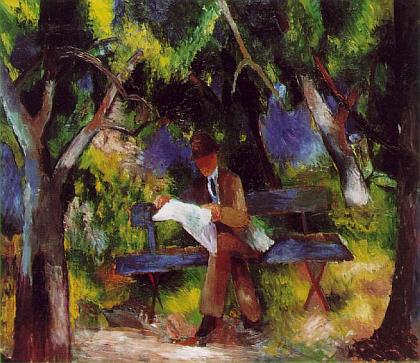
Man Reading in the Park
1914
August Macke
(3 January 1887 – 26 September 1914)
_______________________
The Unbearable Lightness of Blogging
2004
Nick Piombino
fait accompli
on reading Hazlitt's The Letter-Bell (1831)
As I read this with great pleasure, imagining his pleasure in hearing from others, including his editors and other readers, I'm thinking of how much I want to mention all this here. The simultaneity of these interconnected activities within their subsequently evoked internal images, and all the connected feelings is the subject not only of Hazlitt's essay, but the occurance in the present of my anticipation of blogging this as well. Then I realize how much this lightness of blogging I kept thinking about has to do with blogging's complex rearrangements of the correspondances between, reading and writing, publishing and republishing, writing and responding. I've been thinking of Jackson MacLow's appropriations in this regard- and the powerful, silent points they make in regenerating & energizing the equivalence of reading and writing, which bends round ("overlaps") into the equivalence of reader and writer, the foregrounding of one only leading to the silent presence of the other's absence, the words said aloud only leading to the implied occurance of the silent thoughts that precede, and surround the current moment of reading, the past moment of speaking, the future moment of thinking aloud, writing silently, reading again, saying again, again listening, again speaking to & with, again thinking within oneself. ...(more)
_______________________
In the uncertain hour before the morning
Near the ending of interminable night
At the recurrent end of the unending
After the dark dove with the flickering tongue
Had passed below the horizon of his homing
While the dead leaves still rattled on like tin
Over the asphalt where no other sound was
Between three districts whence the smoke arose
I met one walking, loitering and hurried
As if blown towards me like the metal leaves
Before the urban dawn wind unresisting.
- Little Gidding, Four Quartets
T.S. Eliot

Jiri Kolar
_______________________
The Paris Review Interviews
Guy Davenport, The Art of Fiction No. 174
Interviewed by John Jeremiah Sullivan
paris review
Do you have an opinion on the place of the writer within the academy? What effect did all those hours spent looking at writing in a disciplined, critical way have on your own efforts?
I suppose there was, as they say, cross-fertilization, but I don't even like to think about any such thing. Writing, like painting, was my escape from the academy.
It is an interesting question to think about historically, because it's such a recent phenomenon. When does the writer become a part of the university? Neither Shakespeare nor Ben Jonson could have taught at Oxford or Cambridge. If you had gone to what Harold Bloom calls a “strong poet,” a real, undeniable poet like Thomas Hardy, and said, “Mr. Hardy, will you give lectures?” he'd probably have said, “Are you mad?” His mind absolutely could not have got around it. Except for the dons at Oxford and Cambridge, who since the seventeenth century have always taught the young and written books—the tradition that C.S. Lewis and Tolkien fit into, and which includes Walter Pater, Ruskin—it's unthinkable. You could slay a Dane with laughter by suggesting that Kierkegaard might have held a chair in theology.
But in our day you have Nabokov and Auden, both splendid teachers. And the idea of a university where you could not “study literature” is now the unthinkable thing.
My view, as one who taught it, is that the whole purpose of a literary education should be to tell people that these things exist. I don't think any teacher should try to “teach an author” but rather simply describe what the author has written. And this is what I tried to do.
(....)
What moves you to want to narrate the content of a still life?
At any given time the arts are aligned in different ways. Music is sometimes dominant; architecture, painting, poetry, prose narrative. This may be illusion, of course, or blindness on our part. In our time film is way out ahead of prose narrative. It's a veritable mine for the writer. I took my method of collage from Stan Brakhage and Gregory Markopoulos. I lifted my Jules Verne steam balloon from Bergman's Magic Flute. I've borrowed from Jacques Tati, Bill Forsyth, and Mike Leigh. It was Leigh who showed me a new way to end a story: you simply walk away from it after having changed the subject. At the end of Nuts in May, an incomparable satire, the camera finds a pig eating from its trough while the credits run. So I end “The Lavender Fields of Apta Julia” by abandoning the story for botanical information about lavender. Actually, this is a device used brilliantly by George Borrow, whose books simply stop. I like this sense of “okay, that's it” that eloquently supersedes the expectation of surprise and closure. It's a new kind of surprise. Little Niels Bohr is said to have shown his father a homework assignment to look over. The homework was about the periodic table, and Father noted that Niels had left out hydrogen. This was easily fixed: “In conclusion, I would like to mention hydrogen.” This is worthy of Calvin, but suggests with uncorrupted honesty that grand finales are a suspect posture....(more)
_______________________
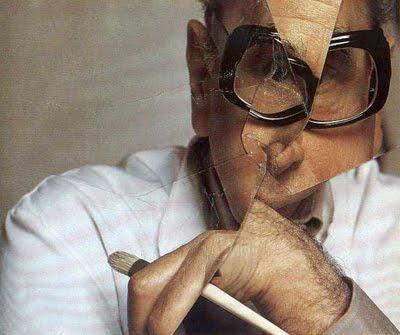 self portrait
Jiri Kolar
b. September 24 1914
Jiri Kolar: The Poetics of Silence
_______________________
The Writing
Franz Wright
It was finished.
He glanced at his watch,
like the doctor who pronounces time of death.
Then he went to bed.
Outside the wind was blowing.
Some more hours passed;
he opened his eyes. And
on the whole he was pleased
to have awakened once more, even though
he still wasn’t that good at it,
and found it so painful and strange.
Drunken Boat 12
_______________________
The Secret Glory
An Interview with Franz Wright
Ernest Hilbert
(....)
Q: Do any particular episodes from your childhood stand out for you today?
It’s such a vast topic. What immediately comes to mind is finding myself in San Francisco (after the strange cross-country drive with my mother and three-year-old brother) at the age of eight and, being left very much to my own devices beginning to explore, on foot and by bike, that incredible city—this was the early sixties—with great trepidation and loneliness that had something exultant about it. I really had no one to answer to, and that was both terrifying and magnificent. I still feel I could find my way around that city blindfolded. It was really around that time, too, that I discovered that there was another parallel world, the world of reading—the first book I recall really falling in love with was Homer’s Iliad. There was just such a sense of loneliness and loss—I loved my father very much and never stopped grieving the loss of him—combined with this weird miraculous sense of privilege and absolute freedom. Though that loneliness was very painful, physically painful, and along with it my lifelong sense of social ineptness, it gradually transformed into something I loved and treasured and would not have traded for anything. I experienced very powerfully a sense of some special destiny, without having the slightest idea of what form it might take—but for a long time that sensation was enough. I will have to give some more thought to this, I guess. I could be more specific, but the specifics would not be very different from anyone else’s childhood, probably. (....)
Some of my best friends teach in MFA programs. But seriously, I do not understand the proliferation of MFA programs over the past quarter century, and have no opinion about it. It’s a subject that offers endless possibilities for someone like me (who never seemed to be able to fit into any adult real world situation for most of his life) for cheap shots, for example: Can you imagine Arthur Rimbaud taking part in a creative writing workshop? But even I realize how childish that is. I have no advanced degrees myself, but that is not something I am proud of—it just didn’t work out like that for me. I have had a couple opportunities, briefly, to teach, and enjoyed them very much—though I must say I infinitely prefer the teaching of literature courses. That is a hell of a lot of fun.
(....)
Q: Your poetry often treats subjects such as emotional and physical recovery. Can you say something about your choice of this subject?
Well, I guess the famous dictum is “write what you know.” Actually, I have always believed it should be the exact opposite, and wish very much that I could be more like, say, René Char, and spend more time in the lyrical absolute than in my wretched personal concerns—and I think I am making a little progress!—but it is the inescapable fact that my life has involved a sometimes nearly lethal struggle with drugs, alcohol, and mental illness (as well as sex and rock & roll, during younger years). I’m a pretty regular baby boom kind of guy in that respect, I suppose. But I think it is also true that from the very start poetry represented for me a way out of a very dark and hostile world into a radiant and serene one, so even when the poems seems to be very dark, I did not experience them that way: I experienced them as blessed moments of escape and relief from my self. ...(more)
_______________________
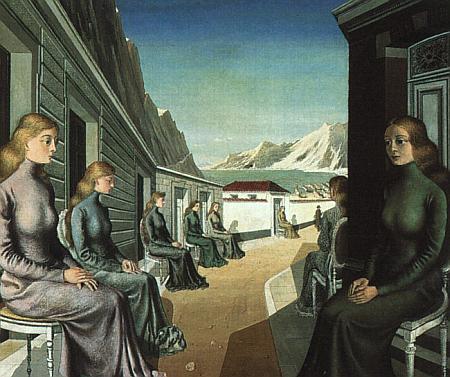
The Village of the Mermaids
1942
Paul Delvaux
b. September 23, 1897
_______________________
Foucault, Borges, Heterotopia: Producing Knowledge in Other Spaces
Robert J. Topinka
Abstract
Arguably the most famous heterotopia that appears in Foucault’s work is the Chinese encyclopedia, which originates in the fiction of Jorge Luis Borges. Drawing on this citation of Borges, this article examines Foucault’s notion of the heterotopia as it relates to order and knowledge production. Frequently, heterotopias are understood as sites of resistance. This article argues that shifting the focus from resistance to order and knowledge production reveals how heterotopias make the spatiality of order legible. By juxtaposing and combining many spaces in one site, heterotopias problematize received knowledge by destabilizing the ground on which knowledge is built. Yet heterotopias always remain connected to the dominant order; thus as heterotopias clash with dominant orders, they simultaneously produce new ways of knowing. This article first explores the tensions between Foucault’s two definitions of heterotopias before connecting these definitions to Foucault’s distinctly spatial understanding of knowledge as emerging from a clash of forces. Finally, the paper ends by returning to the relationship between Foucault, Borges, and heterotopias.
Foucault Studies
Number 9, September 2010
via Philosophy's Other
_______________________
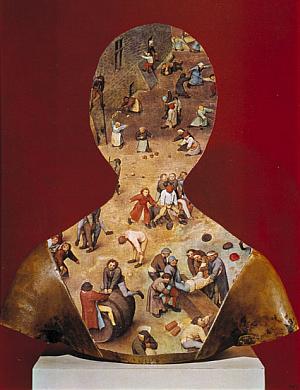
Jiri Kolar
_______________________
Communicative capitalism and the commons
Jodi Dean
(Cesare) Casarino’s reflections on the contribution of the common to understanding communicative capitalism today put in relief some of the challenges in conceptualizing action and resistance when capital operates through communication, when communication is inextricable from capitalist processes of expropriation and exploitation. Communicative capitalism celebrates and relies on constant, nearly inescapable injunctions to participate, to express, to be part of an in common—“we are the world.” This enjoins us to share in an illusion, to embrace a fantasy that extreme inequality is accidental rather than essential to the capitalism of global communication networks. Because we know it’s an illusion, a fantasy, at least part of the work of consciousness-raising is done. The next step is claiming, owning, the division and using it to ally, coordinate, and mobilize anti-capitalist sentiments into a new vision of a communist state....(more)
_______________________
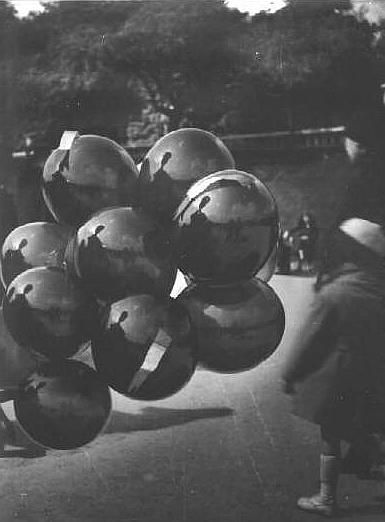
Child With Balloons
Luxembourg Gardens, Paris
1933-39
Josef Breitenbach
1 2
_______________________
America: Shining Execution Chamber Upon a Hill
from Jesus' General by Gen. JC Christian, Patriot
Our Greatest Leader, St Ronnie of the Salvador Option, often referred to our country as a "shining city upon a hill.*" As the most moral and decent nation on Earth, the Most Holy Gipper argued, The United States is the role model others should follow. His greatest hope was that the misguided people of Europe and the impoverished masses of the developing nations would embrace the American religion of unfettered capitalism and vengeful justice.
Tonight, we showed the world, once again, that we are still that shining city on the hill. Ignoring world-wide pleas to do otherwise, we embraced our most basic values and principles by executing a mentally disabled woman.
Teresa Lewis had an IQ of 72. That's just 2 points above the number needed to be officially deemed "mentally retarded."
But that did not stop the good patriots of Virginia from executing her. "She was involved in a murder," they cried, "and by God, she must be killed--Do not deny us the vicarious thrill of killing in the name of justice!"
Lewis wasn't the first mentally disabled person to be executed. We've proudly killed many others before her. Here's a short list of a few of them...(more)
_______________________

photo - mw
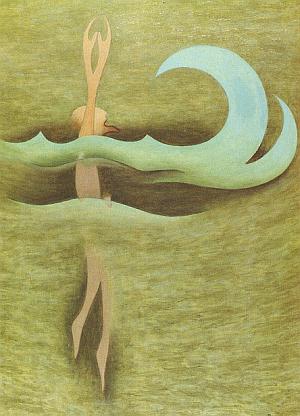
Psalm 69:2,3
...I am sunk in the mire of the deep, where there is no standing...
Light in the Darkness: Benn's Psalms
Benejou Rabinowicz
(1905-89)
A Journey Round My Skull
_______________________
Two essays on Blanchot
Charlotte Mandell
A Language of Absence
There is no such thing as a passive reader of Blanchot. Reading Blanchot becomes an active engagement; he involves the reader in his thinking; he makes the reader think, and respond, and question. Pick up any book of Blanchot, start reading anywhere, and before you're even aware of it, you have become involved: he has engaged you in a conversation; something in you resists, but you read on; suddenly you discover the patience of true reading, the infinite patience required to tease out a subject, play with it, negate it, reassert it, leave it unresolved. Blanchot had infinite patience, and infinite generosity too. He welcomes all of literature, all of it, he lets the words come and he follows them faithfully, so faithfully. Blanchot believed in the power of the word, in the power of language to lead us where it likes, where we may not have thought of going. There is a wonderful selflessness in Blanchot, an emptying-out of self and an investment in language, a faith in the unfailing ability of language to lead us out of ourselves, out of our own nonexistent ego into -- what? Something other, something beyond. After I heard of Blanchot's death -- "Blanchot s'efface," wrote Libération -- I felt a deep sorrow, as if a great presence had left us. I picked up The Writing of the Disaster and opened to this:
"(A primal scene?) You who live later, close to a heart that beats no more, imagine, imagine this: the child -- is he seven, eight perhaps? -- standing, opening the drapes and, through the window, looking out. What he sees -- garden, winter trees, wall of a house -- while he sees, of course as a child would, the place where he plays, he grows tired and slowly looks up to the ordinary sky, with clouds, grey light, the dull daylight with no depth.
"What happens then: the sky, the same sky, suddenly open, absolutely black and absolutely empty, revealing (as if the windowpane had broken) such an absence that everything has always and forever been lost in it, to the point that in it the dizzying awareness forms and vanishes that nothing is what there is, and to begin with nothing beyond. What is unexpected in this scene (its interminable aspect) is the feeling of happiness that immediately overwhelms the child, the ravaging delight to which he can bear witness only through tears, an endless stream of tears. They think the child is upset, they try to comfort him. He says nothing. He will live ever after in the secret. He will not cry any more."
...(more)

Maurice Blanchot
b. September 22, 1907
The Last Man
Maurice Blanchot
The Madness Of The Day
Maurice Blanchot
scribd
The Book, The Sky.
An excerpt from "Joubert and Space,"
in The Book to Come
Maurice Blanchot
translated by Charlotte Mandell
The Gaze of Orpheus & The Essential Solitude
Maurice Blanchot
ifile pdf
The Writing of Disaster
Maurice Blanchot
ifile pdf
Space of Literature
Maurice Blanchot
Translated by Ann Smock
ifile pdf
Friendship
Maurice Blanchot
translated by Elizabeth Rottenberg
ifile pdf
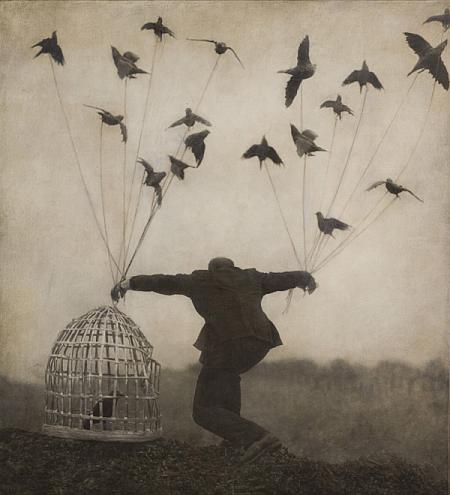
Flying Lesson
Robert & Shana ParkeHarrison: Beginnings
Catherine Edelman Gallery
via Andrew Abb
_______________________
"Without Maurice Blanchot (1907-2003): Readings In Memoriam"
Jean-Michel Rabaté, Josh Schuster, Aaron Levy
Slought Foundation, 87 min
Common Presence: Blanchot at 100
spurious
Spurious' collected posts on Blanchot
“Reading”?
Jonathan Littell
translated by Charlotte Mandell
Write about Blanchot, I am asked – or with him, or alongside him, or against him, it doesn’t matter. A difficult task, he himself would have said. All the more so since the problem immediately arises: how to write in the wake of this thinking without being carried away by its language? No one, to my knowledge, has managed it (except perhaps Foucault, Levinas: frightening predecessors). Well, let us try, even if it means taking that risk.
So what is this reading that Maurice Blanchot invites us to enact here, at once light and serious, a "joyful, wild dance," fundamental (founding the work) in its very insouciance? The first thing one could say about it is that it seems to us inseparable from his conception of writing as experience. "The story [le récit] is not the relation of the event, but that event itself," he wrote around the same time (in "The Song of the Sirens," reprinted in The Book to Come). Writing does not describe, does not relate, does not signify, it does not represent a thing, existing in the world of men or even only in the world of the imagination; it is neither more nor less than "the test of its own experience" (Blanchot again, I forget where, unless it's Bataille – so indistinguishable is their thinking on this point), the faithful account of what happened at that moment, the moment when the one who, seized by the desire to write, sat down in front of a blank piece of paper and began putting language onto it. It's not that the text that results from this experience – poem, story, novel – is deprived of meaning, is not shot through with elements referring to the reality of life; rather it's that these elements function (to use a comparison that Blanchot would no doubt have discreetly avoided) like what Freud called the manifest content of dreams: the rags of reality they cloak themselves with so as both to manifest and veil their truth, their very reality. Thus, if writing is related to truth – and it certainly is, it has to be, or else not be at all, or in any case fall outside of the realm we designate by that mysterious word, literature – it is not by way of knowledge. Literary writing does not explain, does not teach: it simply offers the presence of its own mystery, its own experience, in its absence of explanation, thus inviting not some illusory "understanding" ("Reading either falls short of understanding or overshoots it," writes Blanchot), but precisely a reading....(more)
Espace Maurice Blanchot
Blanchot, The Obscure [pdf]
Colloquy, Issue Ten
Maurice Blanchot [pdf]
Ullrich Haase and William Large
Routledge Critical Thinkers:
Blanchot at 100
celebration in words and music
Bard College
dailymotion
Textual Communities: Nancy, Blanchot, Derrida
Kuisma Korhonen
culture machine
_______________________
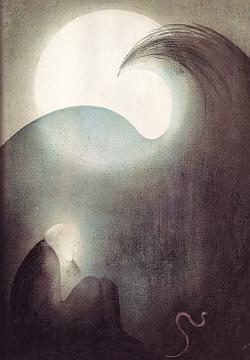
Helga Aichinger
illustrations for Noah and the Rainbow: An Ancient Story
A Journey Round My Skull
_______________________
Lost libraries
The strange afterlife of authors’ book collections
Craig Fehrman
_______________________
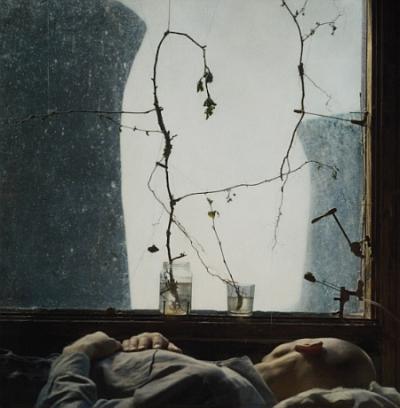 Grey Dawn
Robert and Shana ParkeHarrison
_______________________
To Blanchot
Only a writer can have friends in this way - sans lips, sans hands, sans eyes, sans everything.
James Griffith
ctheory
I am in mourning, yes, but I have always mourned Blanchot, have always felt he ended too soon, that I could have said something, anything (more? at all?) to him before it was too late. One always feels this way when reading, especially when completing a book, but the experience is doubled or halved when the text was Blanchot's. With him, the book was always more than complete, which essentially meant that it never could finish itself. It was complete in that nothing was left to say; he, Blanchot, had already written all that one could ever hope to read on friendship, on death, on the disaster. They were never finished to the extent that he always left me with the hope, an empty hope, but a hope nonetheless, that he had only hinted at the limit. Again, one always feels this way after every book, after great books, but Blanchot's gift was to take this sense of the limit to its own limit.
Blanchot was able to reach such a limit of the limit because he never wrote. Always the perennial writer, Blanchot never wrote anything. His writing was always that of total effacement. "That is what is polite to say when some writer disappears: that a voice has fallen silent, a way of thinking has disappeared," he wrote. But Blanchot had no voice. His writing was, of course, unmistakable. His was a note, a tone, a disharmony. Blanchot never was and insofar as he never was, he spoke the words of a god, or the closest to such an experience as one could ever hope to read. His authority derived from the total lack of authorship he insisted upon and because of that his authority was total, absolute.
All his writing, he said, was posthumous, as is all writing. ...(more)
 Skye Hills from near Morar
c. 1931
William George Gillies
b. September 21, 1898
_______________________
The Night Tree
Jane Draycott
(....)
Next there is ourselves, each man
on his watch for the deception of fog
or the shudder of the tower,
each in his turn keeping awake
for the sake of the light by his reading
of Plutarchķs Parallel Lives, our one book
relayed on the stairs between watches
or else in the pinning of moths flattened
like leaves in the lantern, whose wings
like a searchlight come sweeping our walls
later, finding each of us out in our beds.
But first as I say there is the sea
which is a forest, our blades
cutting through like a photograph,
travellers caught frozen, a sequence
of light and dark pathways, hourglasses,
rain, where time travels even more slowly
as if at great height or in exile and men
report voices heard crying in darkness,
though for myself I think it is only the seals
calling to each other in their language
through all the leafiness of the night.
...(more)
Jane Draycott: Four poemsHorizon Review
Horizon a review of literature & art
Edited by Jane Holland Salt Publishing
Jane Draycott at Poetry International Web
.....................................................
R A D I O R A D I O
PennSound
a sixteen-part series of forty-five minute broadcasts which asks an honest question: Is there really a place on radio for experimentation? Twenty people immersed in radio, sound and performance (Prix Italia winners, Prix Futura winners, SONY winners and platinum recording artists as well as sound poets, unconventional radio producers, audio artists, critically savvy DJs and writers on the social and aesthetic margins) offer, in their own ways, answers to this question through conversation and the presentation of their work. Things called "voice bumpers" frame and counterpoint larger discussions throughout the series. Ironic versions of the music bumpers in NPR-style magazine programs, these voice bumpers combine found sound with conversation fragments from interviews with important radio critics, scholars and inventive practitioners (Allen Weiss, Kersten Glandien, Kenneth Goldsmith, Lauren Goodlad, Mark Percival, Himan Brown, Tim Crook, Matthew Finch, David Chesworth, Sonia Leber, Simon Elmes and Jo Tacchi) to create a listening experience more restless and engaging than it is wallpaper. Program 14: Jane Draycott & Elizabeth James [mp3]
_______________________
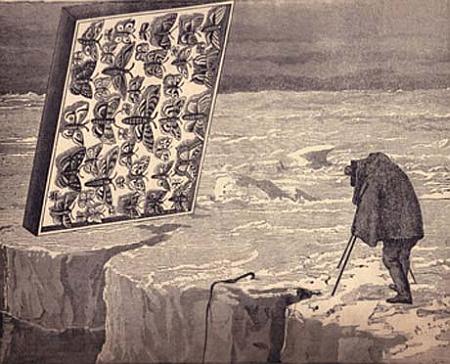
Toyen
(Maria Cerminova)
September 21, 1902
_______________________
Afterword to Selected Poems
Steve McCaffery
sibila
The 1980s proved an important decade for me. In 1986 my critical writings from 1973 through 1986 appeared collectively as North of Intention in a joint Canadian and American venture. It was also a decade in which some of my most substantial poetic texts appeared: the collaborative Legend (1980), the aphoristic Knowledge Never Knew (1983), Evoba (my poetic rescension of Wittgenstein’s Philosophical Investigations, 1987) and The Black Debt (1989) whose two lengthy components (“Lag” and “An Effect of Cellophane”) realized my own poetics of recombination and phrase propulsion (in deliberate contrast to the New Sentence). The year 1988 was marked by the tragic passing of my dear friend and colleague bp Nichol. During the two decades sampled here in Verse and Worse I published eleven poetry titles through nine different presses based in four different countries. I mention these facts to underscore some fundamental proclivities in my writing that should be evident in the material republished here: a stridently anglophonic non-nationalism, a rejection of an ego-based poetry and a deep commitment to formal innovation. Notions of “identity,” “self” and “subject” have never been important factors in my writing. This is not to say that these do not inform my work, but that such matters have never been a focus or preoccupation. As a white heterosexual male, matters of identity are what one tries to escape and I’ve found my persistent commitment to collaboration (critical and creative) a mainstay to non-unity and decentredness. (....)
I’ve always retained from my reading of Charles Olson’s “Projective Verse” one important precept: the structural importance of kinetics to the revelation and disappearance of meaning (his notions of “breath” and “energy” do not factor in my work but importance of kinetics does). Speed is essential to the structure of “Lag” and the finite recombinations that make up “An Effect of Cellophane”.
Another element informing much of this work is a “slippage to indeterminacy.” Barthes’s and Lacan’s notion of the free-floating signifier strikes me as offering a fecund potential for poetics. Saussure too, in his rethinking of the old relation of word to thing as a new relation (and one entirely within language) of signifier and signifier suggested the potential of detachment and a linguistic economy of emancipated signifiers in the search for a non-representational poetry. I’ve long felt the rejection of representation crucial to any investigation into styles of poetic thinking. What constitutes such a discretion? Not entirely the abandonment of logic but certainly the freedom to a certain capriciousness in its application, arrived at through a tactical linking of words into propositional units. I recall puzzling one member in an audience at a reading I did several years ago in London, England, with the phrase “disambiguated geese.” To his question “what does it mean?” I answered “it doesn’t mean anything but it allows you think and in so doing you experience a fresh, perhaps novel juxtaposition of two common words. I think this hones in on the quintessential significance in Barret Watten’s notion of total syntax: a transposition of neologism from the invention of new words to the invention of new phrases and propositional units. Examples of this linguistic-cognitive phenomena populate the selections in this book; they are examples of my commitment to that perhaps masochistic hortation of Modernism to make it new. ...(more)
Verse and Worse: Selected and New Poems of Steve McCaffery 1989-2009
Darren Wershler, editor
Wilfred Lanier University Press, 2010
_______________________
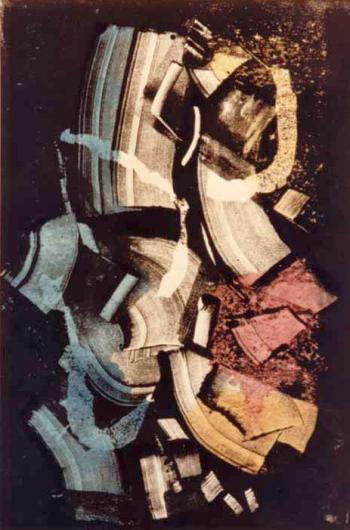
Pierrot Lunaire II
1960
Hardy Strid
The Situationist Superman
_______________________
Philosophical Letters Addressed to a Lady
Petr Chaadaev
(1829)
Translated by Nathaniel Knight
Look around you. Everyone seems to have one foot in the air. One would think that we are all in transit. No one has a fixed sphere of existence; there are no proper habits, no rules that govern anything. We do not even have homes; there is nothing to tie us down, nothing that arouses our sympathies and affections, nothing enduring, nothing lasting. Everything passes, flows away, leaving no trace either outside or within us. In our homes, we are like guests; to our families, we are like strangers; and in our cities we seem like nomads, more so than those who wander our steppes, for they are more attached to their deserts than we are to our towns...
Our memories reach back no further than yesterday; we are, as it were, strangers to ourselves. We move through time in such a singular manner that, as we advance, the past is lost to us forever. That is but a natural consequence of a culture that consists entirely of imports and imitation. Among us there is no internal development, no natural progress; new ideas sweep out the old, because they are not derived from the old but tumble down upon us from who knows where. We absorb all our ideas ready-made, and therefore the indelible trace left in the mind by a progressive movement of ideas, which gives it strength, does not shape our intellect. We grow, but we do not mature; we move, but along a crooked path, that is, one that does not lead to the desired goal. We are like children who have not been taught to think for themselves: when they become adults, they have nothing of their their own--all their knowledge is on the surface of their being, their soul is not within them. That is precisely our situation ...(more)
thanks to Tom Matrullo_______________________
excerpt from Introduction to a Poetics of the Diverse
Edouard Glissant
translated by Pierre Joris
Let me end with some brief thoughts on what I consider one of the most important arts for the future: the art of translation. What every translation henceforth suggests in its very principle, by the very passage it attempts between one language and another, is the sovereignty of all the world’s languages. For this reason translation is both the sign and the evidence that we have to imaginatively conceive this totality of languages. Just as the writer now practices this totality in the language he writes in, so does the translator manifest it in the passage from one language to another, confronted as he is by the singularity of each language. But, just as in our chaos-world one cannot save any one language by letting the others perish, so it is for the translator who cannot establish a relation between two singular systems, between two individual languages, except in the presence of all the other ones, powerful in his imagination, even if he doesn’t know any of them....(more)
excerpts from "The Open Boat" in Édouard Glissant's Poetics of Relation. Translated by Betsy Wing X Poetics
For though this experience made you, original victim floating toward the sea's abysses, an exception, it became something shared and made us, the descendants, one people among others. Peoples do not live on exception. Relation is not made up of things that are foreign but of shared knowledge. This experience of the abyss can now be said to be the best element of exchange.
....
This is why we stay with poetry. And despite our consenting to all the indisputable technologies; despite seeing the political leap that must be managed, the horror of hunger and ignorance, torture and massacre to be conquered, the full load of knowledge to be tamed, the weight of every piece of machinery that we shall finally control, and the exhausting flashes as we pass from one era to another--from forest to city, from story to computer--at the bow there is still something we now share: this murmur, cloud or rain or peaceful smoke. We know ourselves as part and as crowd, in an unknown that does not terrify. We cry our cry of poetry. Our boats are open, and we sail them for everyone....(more)
_______________________
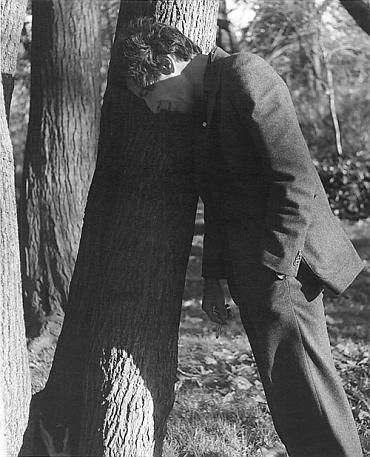
Leonard Cohen
b. Sep 21, 1934
photo - David Boswell
_______________________
The United States has always maintained a white underclass -- citizens whose role in the greater scheme of things has been to cushion national economic shocks through the disposability of their labor, with occasional time off to serve as bullet magnets in defense of the Empire. Until the post-World War II era, the existence of such an underclass was widely acknowledged.
Today, almost nobody in the social sciences seems willing to touch the subject of America's large white underclass; or, being firmly placed in the true middle class themselves, can even agree that such a thing exists. Apparently, you can't smell the rabble from the putting green.
- Joe Bageant, excerpt, Rainbow Pie: A Redneck Memoir (Portobello Press, 2010)
_______________________
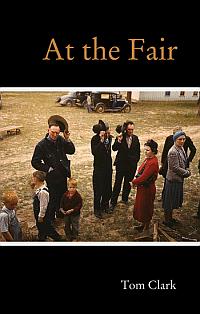
At the Fair
Tom Clark
BlazeVOX
I've known and read Tom Clark for almost half-a-century as a master of many genres: a writer of plays, biographies, novels; as an editor and critic — but always foremost, as a poet. At the Fair gives glimpses of this poet peering through the eyes of his reflection in the mirror of time and reporting on the memories of that image. Part autobiography of the author in shards; part philosophy of atmosphere and thought; part natural history of air, land and water; part defense of the local; part the literate writer at work, translating, being distracted by the logic and beauty of language: this book, which I read straight through, is a tribute to a lifelong addiction: a mutable one-handed keep-awake smack in the forest of loss. One's hat is raised as observation passes.
—Tom Raworth
_______________________
Midwest Peace
Justin E. H. Smith
Our Christian, free-will-based legal system makes a distinction that our not yet fully de-Hellenized, fatalistic subconsciences can't quite accept. You can’t hit a guy without being tainted. You definitely can’t hit a Vietnam vet. (....)
when I forced the door open and slithered out to go check on Travis, in my state of curiously heightened alertness I was able to examine the covers of all the great works of philosophy that were spilling out onto the grassy division. There went Jan-Baptista van Helmont's De Ortu medicinae! And there's the single-volume edition of Spinoza's collected works! Why, he barely wrote anything! Any scholar who works on Spinoza should be required to memorize him by heart, I thought. And there's Shame and Necessity! What a book! What a hammer of a book!
Within a few moments the Indiana state troopers would arrive, and I recall them scratching their heads and laughing as they went around picking up the far-flung works of philosophy. I recall seeing one of them holding Hegel’s Phänomenologie des Geistes. “Do you understand this?,” he asked me. No, I said. Not really. ...(more)
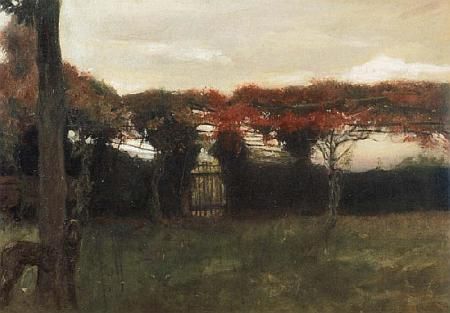
Max Slevogt
(October 8, 1868 – September 20, 1932)
_______________________
The Activity of Evidence: Robert Creeley’s New Zealand
Virginia Gow
The story has no time finally. Its shape, if form can so be thought of, is a sphere, an egg of obdurate kind. The only possible reason for its existence is that it has, in itself, the fact of reality and the pressure. There, in short, is its form – no matter how random and broken that will seem. The old assumptions of beginning and end – those very neat assertions – have fallen away completely in a place where the only actuality is life, the only end (never realized) death, and the only value, what love can manage. It is impossible to think otherwise, or at least I have found it so. I begin where I can, and end when I see the whole thing returning. (Creeley, Preface to The Gold Diggers, first published on Mallorca in 1954. Collected Prose 11)
*
During his first visit to New Zealand in 1976, the American poet Robert Creeley writes in Wellington:
I want to be a dog,
when I die –
a dog, a dog.
(Hello: A Journal 13)
I like this poem.
For one thing, ‘I want to be a dog’ is a constant reminder to me that words are carriers of sound and memory – largely because when I read ‘I want to be a dog’ I can’t help but recall the time I misheard the lyrics for the Stone Roses song I wanna be adored.
‘I want to be a dog’ is also a bridge of sorts to Creeley’s return visit to New Zealand almost twenty years later in 1995, where he sets a loop track going on his experience of being (again) in this location:
Hence the
dogs,
‘The Dogs of Auckland,’ who were there first walking along with their company,
seemed specific to given streets, led the way, accustomed.
Nothing to do with sheep or herding, no presence other than one uncannily human,
a scale kept the city particular and usefully in proportion.
(The Dogs of Auckland)
Or, in that same poem, narrowing in on the self in language:
Not “The Dogs” but The Dog of Auckland –
Le Chien d'Auckland, c'est moi!
(The Dogs of Auckland)
Perhaps coincidentally (though Creeley was aware of it), the poet William Carlos Williams also once wrote: ‘I would rather sneak off and die like a sick dog than be a well known literary person in America – and no doubt I’ll do it in the end.’ (In the American Grain 217)
Which seems as good a place as any for me to begin....(more)
k a m a t e k a o r a
a new zealand journal of poetry and poetics via Nick Piombino
_______________________
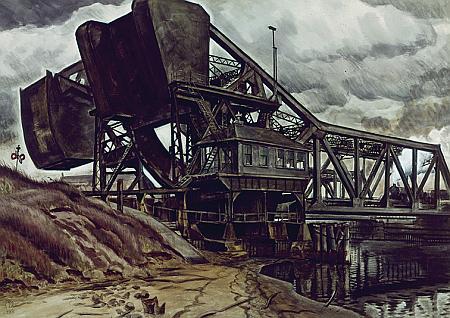
Black Iron
Charles Burchfield
1935
Charles Burchfield: Realism
Tom Clark
The smashed weirdness of the raving cadenzas of God
Takes over all of a sudden
In our time. It speaks through the voices of talk show moderators.
...(more)
_______________________

photo - mw
_______________________
Scary People, Scary Times
James Howard Kunstler
In that order. The scary people have already started coming out of the woodwork. The times lately have been mostly uncertain, but soon they'll turn scary, too, as it becomes clearer that the people running things in the USA have no idea what's going on or what they're going to do about it -- and what's going on is an involuntary permanent re-set of the terms of everyday life, from a wet-dream robotic "consumer" techtopia to something more like the first chapter of Tobacco Road, with a family of half-wits reduced by hard times to fighting over a sack of turnips in a roadside ditch. That's the story-arc anyway, and lots of people won't like it. But the theme of dwindling resources is not a pretty one.
Today, no one present in the political arena appears to have a clue and, lacking clues, any ability to articulate the terms of what we face. Both major parties are hostage to a peculiar nostalgia, a wish to return to the time when America could dream up any kind of machine or breakfast cereal or techtronic brassiere, and sell the manufactured surplus from our own happily oversold markets to the rest of the clamoring world - even lending them the cash (at interest) to buy the stuff. America makes and the world takes, was the theme song then. That earnest, upward-striving society of Eisenhower simplicity, of well-paid factory workers dreaming of a little summer place at the lake, and the Main Streets bustling in the cheerful early twilight of Christmas Eve, and the Beach Boys crooning about "fun, fun, fun," and purloined German physicists stashed in comfortably aire-kooled rooms, turning a few tossed-off equations into moon-shots, and Bob Hope cracking wise before a nationwide audience of car-dealers and self-satisfied Rotarians - well that America has imploded like a weevil-infested hubbard squash in a back pantry. And all the prayers to Moloch by the Jesus boomers in and out of congress won't make it whole again....(more)
_______________________
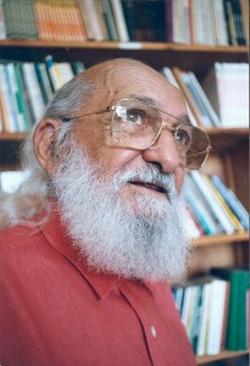
Paulo Freire
b. September 19, 1921
Pedagogy of the Oppressed
Paulo Freire
Translated by Myra Bergman Ramos
mediafire pdf
The central problem is this: How can the oppressed, as divided, unauthentic beings, participate in developing the pedagogy of their liberation? Only as they discover themselves to be “hosts” of the oppressor can they contribute to the midwifery of their liberating pedagogy. As long as they live in the duality in which to be is to be like, and to be like is to be like the oppressor, this contribution is impossible. The pedagogy of the oppressed is an instrument for their critical discovery that both they and their oppressors are manifestations of dehumanization.
Liberation is thus a childbirth, and a painful one. The man or woman who emerges is a new person, viable only as the oppressor-oppressed contradiction is superseded by the humanization of all people. Or to put it another way the solution of this contradiction is born in the labor which brings into the world this new being: no longer oppressor nor longer oppressed, but human in the process of achieving freedom.
This solution cannot be achieved in idealistic terms. In order for the oppressed to be able to wage the struggle for their liberation they must perceive the reality of oppression not as a closed world from which there is no exit, but as a limiting situation which they can transform. This perception is a necessary but not a sufficient condition for liberation; it must become the motivating force for liberating action. Nor does the discovery by the oppressed that they exist in dialectical relationship to the oppressor, as his antithesis that without them the oppressor could not exist — in itself constitute liberation. The oppressed can overcome the contradiction in which they are caught only when this perception enlists them in the struggle to free themselves.
_______________________
The Fifty Most Influential Progressives of the Twentieth Century
Peter Dreier
A hundred years ago, any soapbox orator who called for women's suffrage, laws protecting the environment, an end to lynching, workers' right to form unions, a progressive income tax, a federal minimum wage, old-age insurance, the eight-hour workday and government-subsidized healthcare would be considered an impractical utopian dreamer or a dangerous socialist. Now we take these ideas for granted. The radical ideas of one generation are often the common sense of the next. When that happens, give credit to the activists and movements that fought to take those ideas from the margins to the mainstream. We all stand on the shoulders of earlier generations of radicals and reformers who challenged the status quo of their day.
Unfortunately, most Americans know little of this progressive history. It isn't taught in most high schools. You can't find it on the major television networks or even on the History Channel. Indeed, our history is under siege. In popular media, the most persistent interpreter of America's radical past is Glenn Beck, who teaches viewers a wildly inaccurate history of unions, civil rights and the American left....(more)
_______________________
The United States of Inequality
in 9 parts
Trying to understand income inequality, the most profound change in American society in your lifetime.
Timothy Noah
_______________________

photo - mw
_______________________
The Adventure Of A Photographer
Italo Calvino
c 1958
(trans. from Italian by William Weaver)
It must be said that his examination of photography to discover the causes of a private dissatisfaction—as of someone who feels excluded from something—was to a certain extent a trick Antonino played on himself, to avoid having to consider another, more evident, process that was separating him from his friends. What was happening was this: his acquaintances, of his age, were all getting married, one after another, and starting families, while Antonino remained a bachelor.
Yet between the two phenomena there was undoubtedly a connection, inasmuch as the passion for the lens often develops in a natural, virtually physiological way as a secondary effect of fatherhood. One of the first instincts of parents, after they have brought a child into the world, is to photograph it. Given the speed of growth, it becomes necessary to photograph the child often, because nothing is more fleeting and unmemorable than a six-month-old infant, soon deleted and replaced by one of eight months, and then one of a year; and all the perfection that, to the eyes of parents, a child of three may have reached cannot prevent its being destroyed by that of the four-year-old. The photograph album remains the only place where all these fleeting perfections are saved and juxtaposed, each aspiring to an incomparable absoluteness of its own. In the passion of new parents for framing their offspring in the sights to reduce them to the immobility of black-and-white or a full color slide, the nonphotographer and non-procreator Antonino saw chiefly a phase in the race toward madness lurking in that black instrument. But his reflections on the iconography-family-madness nexus were summary and reticent: otherwise he would have realized that the person actually running the greatest risk was himself, the bachelor....(more)
_______________________
Why Photography Matters
Gary Sauer-Thompson
junk for code
I'm down at Victor Harbor for this week to start the ball rolling on large format photography. Photography matters for me. But why? One attempt an answering is Michael Fried in his Why Photography Matters As Art As Never Before; a text concerned with exploring the importance of contemporary tableau photography—defined as large-scale photographs intended to be hung on walls and viewed as painting. It rejects the narrow view of photography – the idea that the camera is a recording device, not a creative tool, and that its product is strictly representational – not manipulated, not fabricated, not abstract …
(....)
Photography matters, Michael Fried argues , because it has become the place where a certain crisis of the picture inaugurated in the late 1960s has played out most meaningfully. This crisis was enunciated clearly in the title "Art and Objecthood." Is a certain thing art or an object? The ontological nature of photographic representation as it has been understood in the last thirty years or so--that it is indexical, baring the physical traces of the thing it represents means that it has become a medium uniquely charged with the task of overcoming its seeming belonging to the world of objects. Up until the mid-1970s, making art photography meant denying the indexical nature of the medium and prioritizing the pictorial surface, something that has come under enormous pressure for a variety of reasons.
To make art from photography today means instead to accept the indexical nature of the medium and to find ways of establishing photography as a properly pictorial, that is to say artistic, form of representation. ...(more)
_______________________

Stevie Smith
b. September 20, 1902
Not Waving but Drowning
Stevie Smith
Nobody heard him, the dead man,
But still he lay moaning:
I was much further out than you thought
And not waving but drowning
.
Poor chap, he always loved larking
And now he’s dead
It must have been too cold for him his heart gave way,
They said.
Oh, no no no, it was too cold always
(Still the dead one lay moaning)
I was much too far out all my life
And not waving but drowning.
Stevie Smith: Girl, Interrupted
Jessica Walsh Papers on Language and Literature, Winter 2004
_______________________
To an Aesthete Dying Young
(In Memoriam T. R. K.)
Andrew Solomon
Depression is a disease of loneliness, and the privacy of a depressed person is not a dignity; it is a prison. Therapists can be perilously naļve about this. Marcello and all of us who loved Terry were locked out by the same privacy that kept him locked in. Privacy is a fashionable value in the twenty-first century, an overrated and often destructive one; it was Terry’s gravest misfortune. The unknowable in him, which I thought was just a kind of static, was actually his heart....(more)
_______________________

photo - mw
_______________________
Our Bog is Dood
Stevie Smith
Our Bog is dood, our Bog is dood,
They lisped in accents mild,
But when I asked them to explain
They grew a little wild.
How do you know your Bog is dood
My darling little child?
We know because we wish it so
That is enough, they cried,
And straight within each infant eye
Stood up the flame of pride,
And if you do not think it so
You shall be crucified.
Then tell me, darling little ones,
What's dood, suppose Bog is?
Just what we think, the answer came,
Just what we think it is.
They bowed their heads. Our Bog is ours
And we are wholly his.
But when they raised them up again
They had forgotten me
Each one upon each other glared
In pride and misery
For what was dood, and what their Bog
They never could agree.
Oh sweet it was to leave them then,
And sweeter not to see,
And sweetest of all to walk alone
Beside the encroaching sea,
The sea that soon should drown them all,
That never yet drowned me.

Matthieu Gafsou
more
_______________________
In My Own Recognizance
Ronald Sukenick
1932 - 2004
ebr
I personally am enamored of the traditional Canon but not interested in repeating it. My ways of avoiding it are through the practice of certain mental gymnastics, or, rarely, through the use of constrictive form as with the Oulipo group whom I consider creative cousins.
Mental gymnastics: ways of blocking the already formulated in pursuing the unformulated.
I try to write in that mental space of 30 seconds where the past claws at the future to produce what we call the present. That helps me get past the premeditated.
Remember the future. That helps me avoid the prefabricated.
(....)
Collage and cutup are ways of interrupting the continuity of the controlling discourse - mosaic is a way of renewing discourse.
Mosaic: new tiles, old fragments, odd scraps - remix. Out of remnants new design. Continuous not discontinuous.
It should be obvious: what's true here and now was not true there and then. But why does that prevent us from trying for truth? Imitate athlete's intelligence operating in a continuous present. Faster than thought.
Grammar of event: event modifying event = further event.
Stupidity can be a virtue. Virtue can be a vice. Artists don't have to be nice.
In the arts evaluation of necessity implies connoisseurship.
Epigrams are half truths. The illuminating half....(more)
Narralogues: truth in fiction
Ronald Sukenick google books
Mosaic Man Ronald Sukenick google books
The Endless Short Story
Ronald Sukenick google books
_______________________

Candida Höfer
1 2
Candida Höfer: The Atmosphere of Absence
Caoimhin Mac Giolla Léith
_______________________
a an av es
Alan Davies
an anemone or we cones careen
warm venom veers on eve
sonorous moves nor arrears
warns means nervous concern
succor woman vane verse
moon care swear ensures
morse moan ever careers
serum seam one reason coven
coarseness owner more serene are
numerous moaner can acre
were vows ore moron core crevasse
converse cosmos answer rear ours
snows wane warmer noun unease
anus users owns saw serves
murmur worsens neon mane musers
amen worm earns ear roam
avows essence scorn ace arms numen
vase urn raves no rose arse craven
evanescence covers canon nonsense
maven caesura comma venus sores
waxen sorrow acumen wrens remove
nacreous reverence cavern accrue
curve reserve cancerous come razz
awesome avers summer swarm ease
...(more)
The Ubuweb Anthology of Conceptual Writing
edited by Craig Douglas Dworkin
via Nick Piombino
_______________________
“American scientific companies are cross-breeding humans and animals and coming up with mice with fully functioning human brains. So they’re already into this experiment.”
-
Christine O’Donnell
_______________________
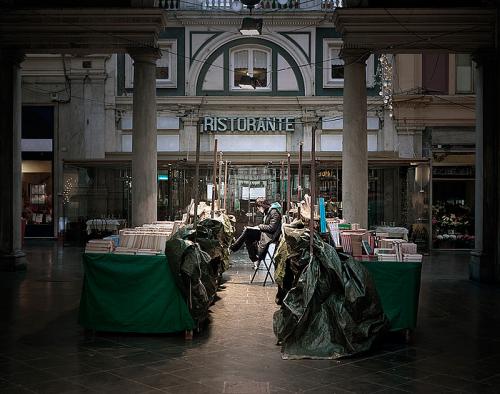
Matthieu Gafsou
_______________________
Preface to A Dictionary of the English Language
Samuel Johnson
September 18, 1709 - December 13, 1784
When first I engaged in this work, I resolved to leave neither words nor things unexamined, and pleased myself with a prospect of the hours which I should revel away in feasts of literature, the obscure recesses of northern learning, which I should enter and ransack, the treasures with which I expected every search into those neglected mines to reward my labour, and the triumph with which I should display my acquisitions to mankind. When I had thus enquired into the original of words, I resolved to show likewise my attention to things; to pierce deep into every science, to enquire the nature of every substance of which I inserted the name, to limit every idea by a definition strictly logical, and exhibit every production of art or nature in an accurate description, that my book might be in place of all other dictionaries whether appellative or technical. But these were the dreams of a poet doomed at last to wake a lexicographer. I soon found that it is too late to look for instruments, when the work calls for execution, and that whatever abilities I had brought to my task, with those I must finally perform it. To deliberate whenever I doubted, to enquire whenever I was ignorant, would have protracted the undertaking without end, and, perhaps, without much improvement; for I did not find by my first experiments, that what I had not of my own was easily to be obtained: I saw that one enquiry only gave occasion to another, that book referred to book, that to search was not always to find, and to find was not always to be informed; and that thus to persue perfection, was, like the first inhabitants of Arcadia, to chace the sun, which, when they had reached the hill where he seemed to rest, was still beheld at the same distance from them.
I then contracted my design...(more)
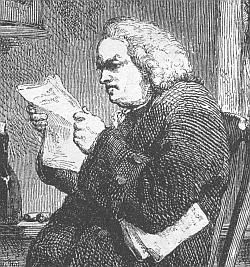
_______________________
Virilio's Apocalypticism
Mark Featherstone
ctheory
... we know that the apocalypse is on the American mind. Consider the born again Christian fundamentalists. They understand the endless war in the Middle East, the lands of deserts, Iraq, the birth place of human culture and civilization, and Armageddon, the site of the final battle between the forces of good and evil, as the scene of the coming apocalypse where the saved will be separated from the damned and the world will learn what America already knows, that it is the land of God. Again we can discern the strange virtualisation of the world, which Virilio understands as characteristic of the light speeds of globalisation, where metaphysics and theology stand in for politics, define the direction of our world, and set the scene for an apocalyptic moment that will transform the basic co-ordinates of human reality. Unfortunately, the contemporary American apocalypse, which updates Winthrop's theory of the city upon the hill in popular and official culture ranging from Tim LaHaye's Left Behind books to the Bush regime's PNAC, is not the apocalypse imagined by Virilio. Whereas his theory suggests creating speed limits or a 'political economy of speed' in order to enable humans to live together in the world, the American vision of the apocalypse is about destroying what little environmental resistance there is left in the world in order to completely liberate humanity from its reliance on natural life support systems. ...(more)
_______________________
It's Not the End of the World! Three Works
David Franks
exquisite corpse
The End of the World ...
An “Involuntary collaboration” with Ferdinand Pessoa)
A street blocked off to all thought
Today, tomorrow & forever
With love spreading dankness on the walls and white hair on heads
I thoughtlessly cross the street looking straight ahead forgetting --
...(more)
_______________________

Matthieu Gafsou
_______________________
Poems: John Berger
left curve
Twelve Theses on the Economy of the Dead
1. The dead surround the living. The living are the core of the dead.
In this core are the dimensions of time and space.
What surrounds the core is timelessness.
2. Between the core and its surrundings there are exchanges, which are not
usually clear. All religions have been concerned with making them clearer.
The credibility of religion depends upon the clarity of certain unusual exchanges.
The mystifications of religion are the result of trying to systematically produce such exchanges.
3. The rarity of clear exchange is due to the rarity of what can cross intact the frontier between timelessness and time.
4. To see the dead as the individuals they once were tends to obscure their nature.
Try to consider the living as we might assume the dead to do:
collectively.
The collective would accrue not only across space but also throughout time.
It would include all those who had ever lived. And so we would also be thnking of the dead.
The living reduce the dead to those who have lived, yet the dead already include the living in their own great collective.
5. The dead inhabit a timeless moment of construction continually rebegun.
The construction is the state of the universe at any instant.
6. According to their memory of life, the dead know the moment of construction as, also, a moment of collapse.
Having lived, the dead can never be inert.
7. If the dead live in a timeless moment, how can they have a memory?
They remember no more than being thrown into time, as does everything which existed or exists.
8. The difference between the dead and the unborn is that the dead have this memory.
As the number of dead increases, the memory enlarges.
9. The memory of the dead existing in timelessness may be thought of as a form of imagination concerning the possible.
This imagination is close to (resides in) God, but I do not know how.
10. In the world of the living there is an equivalent but contrary phenomenon.
The living sometimes experience timelessness, as revealed in sleep, ecstasy,
instants of extreme danger, orgasm, and perhaps in the experience of dying itself.
During these instants the living imagination covers the entire field of experience
and overruns the contours of the individual life or death. It touches the waiting imagination of the dead.
11. What is the relation of the dead to what has not yet happened, to the future?
All the future is the construction in which their “imagination” is engaged.
12. How do the living lie with the dead? Until the dehumanisation of society by capitalism,
all the living awaited the experience of the dead. It was their ultimate future. By themselves the living were incomplete.
Thus living and dead were inter-dependent. Always. Only a uniquely modern form of egotism has broken this inter-dependence.
With disastrous results for the living, who now think of the dead as eliminated.
Hold Everything Dear: Dispatches on Survival and Resistance John Berger google books
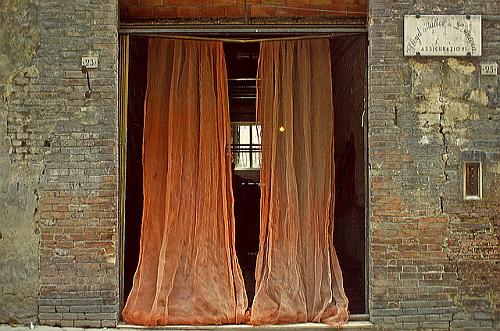
Siena, Italy
Terje Enge
_______________________
After the Sophomore’s Work
David Auerbach
Waggish
...I can only figure that people who say that they’re cut off from the intensity of early aesthetic experiences have either had their horizons narrowed sufficiently that they no longer are open to that which is novel to them, or, more likely, they’ve just become lax about finding those new things. And yes, it does get tougher, not just because deeper digging is required but because the criteria for fulfillment evolve, and it takes a fair bit of work to satisfy the absence of what Robert Musil describes in this passage:
Just as in dreams we are able to inject an inexplicable feeling that cuts through the whole personality into some happening or other, we are able to do this while awake–but only at the age of fifteen or sixteen, while still in school. Even at that age, as we all know, we live through great storms of feeling, fierce urgencies, and all kinds of vague experiences; our feelings are powerfully alive but not yet well defined; love and anger, joy and scorn, all the general moral sentiments, in short, go jolting through us like electric impulses, now engulfing the whole world, then again shriveling into nothing; sadness, tenderness, nobility, and generosity of spirit form the vaulting empty skies above us. And then what happens? From outside us, out of the ordered world around us, there appears a ready-made form–a word, a verse, a demonic laugh, a Napoleon, Caesar, Christ, or perhaps only a tear shed at a father’s grave–and the “work” springs into being like a bolt of lightning. This sophomore’s “work” is, as we too easily overlook, line for line the complete expression of what he is feeling, the most precise match of intention and execution, and the perfect blending of a young man’s experience with the life of the great Napoleon. It seems, however, that the movement from the great to the small is somehow not reversible. We experience it in dreams as well as in our youth: we have just given a great speech, with the last words still ringing in our ears as we awaken, when, unfortunately, they do not sound quite as marvelous as we thought they were. At this point we do not see ourself as quite the weightlessly shimmering phenomenon of that dancing prairie cock, but realize instead that we have merely been howling with much emotion at the moon.
And if it wasn’t an article of faith that the movement to the small yields equally visceral and more meaningful results than the easy transcendence of adolescent (and arrested-adolescent) poetic narcissism…I wouldn’t be writing here....(more)
_______________________
Night Prayer
Kazim Ali
I lived near the archive for years but never read it.
Instead dropped letters folded as boats into the stream at midnight.
The white lines of a graph moored me to them.
From that moment I was thirsty, remembering my earlier thirst.
Standing still at the sill of the window, wanting to know
who was looking out. But how can a window answer?
All my naval missives were cast between map and maelstrom,
and if I ever dared to pray for something real
would it be for my thirst to be quenched or for unquenchable thirst—
8 Poems
drunken boat
_______________________
Mark Weiss: 3 Poems & an Excerpt from “A Provisional Poetics”
courtesy of Jerome Rothenberg
(....)
The known and the knowable are always under siege, because it's not so much that we're on occasion in a stable place as that the rate of change on occasion slows down. Change is the constant. The poem is situated in that awareness, and to the extent that we have the courage to stay there it inhabits the liminal, which is by its nature formless. And the poem grounds itself in the particular because that's all there is to hold onto, and the only clues offered.
It's the willful relinquishing of resistance to liminality. And it differs from the ritual practice of possession because, unlike the ritual, which, if done properly, always brings the participant out the other end (imagery of rebirth is inevitable here), it has no preordained pattern, no life-rope, no social structures surrounding it that announce when the participant has reached the new place and what place that is.
This may sound like the fugue state of psychosis, but in fact the crazy rarely will themselves to relinquish the inhibitions to behaviors seen as crazy and to the internal states that drive those behaviors. They really know that they may not be able to come back. I once asked a group of for-the-moment stable schizophrenics about a fantasy. They exchanged a few panicky glances and then assured me, one after the other, in the manner of well-behaved school-children, that they didn't have fantasies.
Somewhere the poet has the sense that there's an internal structure to escape to, and it's that faith that gives him the courage to dive in when he's able. ...(more)
_______________________

Hazardville, Connecticut
Lewis Hine
1917
Children Galerie Priska Pasquer
Photographs by Charles Nègre, Adolphe-Eugène Disdéri, Mayer & Pierson, Heinrich Kühn, Hugo Erfurth, August Sander, Lewis Hine, Alexander Rodchenko, Paul Citroen, Aenne Biermann, Annelise Kretschmer, Elizaveta Svilova-Vertova, Raoul Hausmann, Brassai, Walker Evans, Weegee, Lisette Model, Michael Ruetz, Achim Lippoth, Michael Schmidt, Rudolf Bonvie, Jochen Gerz, Astrid Klein, Christian Boltanski.
_______________________
The Rhetorics of Life and Multitude in Michel Foucault and Paolo Virno
Stuart J. Murray
ctheory
How might we formulate the question of life -- of bios -- itself? This essay discusses some of the contemporary forms in which "life" is emerging as an object of discourse, as political life, social life, and ethical life. What, then, is life? And what does it mean for life to pose as an object of human knowledge? Has life itself become an object to be discussed, known, controlled, and maximized, preserved, or even ransomed and bartered? My approach is rhetorical, that is, I am interested in the ways that we speak about life, its contexts, and how it circulates in discourses from the scientific to the sacred, producing real and often deadly effects. Rather than hammering out yet another definition, I attempt to put this term into play, rhetorically, suggesting that this play itself captures some of the irreducible creativity and mobility of what we mean by life when it is spoken. By continuing to ask the question of life in multiple and shifting ways, we refuse to fix upon a definitional answer (refusing both "objective" and "subjective" definitions). I am wary of such definitions for political reasons: definitions allow us to judge -- sometimes mechanically and unthinkingly -- life from nonlife, the living from the nonliving, and thereby import a normativity that the ethics of this essay will challenge.
More precisely, in a rhetorical vein I fear the fundamentalist collapse of speaking and being. According to such a logic, the word and the thing are joined in a natural and holy matrimony. The word becomes Truth, and those who claim to speak in the name of life would put an immediate end to all further discourse on the matter, speaking as if they themselves were gods. The fundamentalist collapse of speaking and being reduces the plenitude of being -- and life itself -- to an object of knowledge that falls within the compass of our speech. But life is no such thing; it is not an object of knowledge. My argument is therefore a polemical inversion of this fundamentalism: to preserve the ontological mobility and creativity of life while suggesting a form of speech that would be more commensurate with this view on life. This form of speech is rhetorical, a vital speaking that enacts and is enacted by this mobile and creative life-force. ...(more)
_______________________
Commonplaces of technology critique
Kathrin Passig
Translation by Saul Lipetz
eurozine
Anyone who insists on sticking throughout their entire life to the view they formed of the world in their youth develops the intellectual equivalent of a comb-over: what looks to oneself almost the same as before, to everyone else are just three hairs scraped across a bald head. As long as we cannot be "flashy-thinged", like in the film Men in Black, we have to keep setting ourselves the tedious task of forgetting, of unlearning. With any luck the government will see sense and offer educational opportunities for adults in future – where we can discard knowledge that has become a nuisance, let's say about libraries, typewriters, publishing houses or television....(more)
_______________________
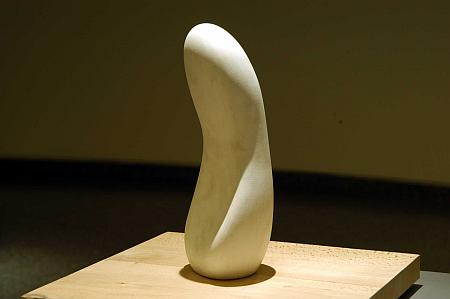
Silencieux
1942
Jean Arp
b.September 16, 1886
_______________________
The Paranoid Style in American Politics
Richard Hofstadter
Harper's Magazine, November 1964
This Country Just Can't Deal with Reality Any More
the consequences of the nation’s three-decade-old decoupling from reality are becoming painfully obvious.
Robert Parry
The Strange Death of Moderate Republicanism
E.J. Dionne, Jr.
_______________________
Great News: There’s a Christian Search Engine for People Scared of Obama, Sex and Lady Gaga
_______________________
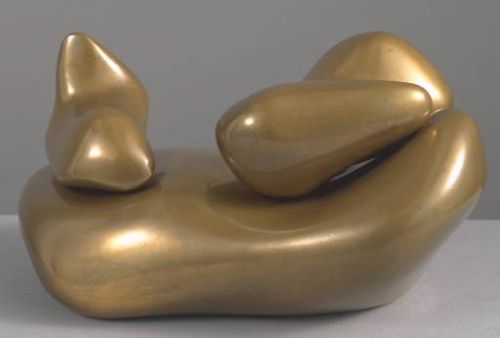
Sculpture to be Lost in the Forest
Jean Arp
1932
_______________________
James Scott on Agriculture as Politics, the Dangers of Standardization and Not Being Governed
Theory Talk #38
It is powerful institutions that have most to conceal about the operations of power and about how the world actually works. I thought that the emancipatory potential of social science was actually simply doing your work honestly, showing how things really operate, that this would always have a subversive effect because it was the powerful institutions that had the most to hide and conceal. Good social science, I thought, would by its nature be emancipatory and have a kind of resistance function. I have less confidence nowadays about the motives of people who want to unearth how things work; they bring their own powerful prejudices to bear, and their motives are not always motives I find worthy.
When I used to be asked about my relation to Marxism I used to say that I’m a crude Marxist, with the emphasis on ‘crude’, in the sense that I look at the material basis of any political struggle, and I think class and material basis are the best points of departure for analysis. And what I add to that—and that’s why I was so taken with Karl Polanyi’s Great Transformation—is that it seems to me a powerful argument about the way the economy was embedded historically in other social relations and could not be extracted from it until the early 19th century when the laissez-faire ideology was elaborated. The struggle that Polanyi points to is a struggle that we’re still engaged in, and certainly after the Washington Consensus we’re going to have to invent forms of social protection of the kind Polanyi talked about. Whether we call them socialism or not, it is the kind of self-defense of people’s life chances and subsistence. How to protect ordinary human beings against market excesses is a classical socialist question still very much to the fore....(more)
_______________________
A note about the "s lot's" blogroll
google is popping up a malicious warning on the rpc blogrolling list (in firefox and safari) so I will remove the code from the main page for now. It's time I edited and handrolled the list anyway. - mw
|

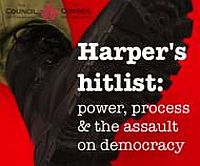

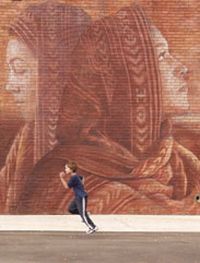 Janus Head
Janus Head

 The Age of Briggs & Stratton
The Age of Briggs & Stratton


















































